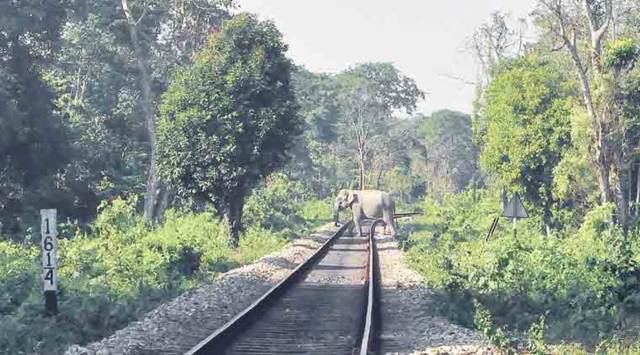Stay updated with the latest - Click here to follow us on Instagram
Wildlife conservationists raise strong pitch against Hubballi-Ankola railway project
Conservationists objected to a meeting organised by a seven-member National Board for Wildlife (NBWL) committee last week to discuss the project in Uttara Kannada district.
 Wildlife conservationist Joseph Hoover told indianexpress.com that he had elaborated his objections to the project in a letter addressed to the Karnataka forest department and the district administration of the Uttara Kannada district. (File)
Wildlife conservationist Joseph Hoover told indianexpress.com that he had elaborated his objections to the project in a letter addressed to the Karnataka forest department and the district administration of the Uttara Kannada district. (File)Infrastructure development cannot be conceived at a rate that destabilises societies rooted in the last remaining delicate ecologies of this country, said wildlife conservationists objecting to a meeting organised by a seven-member National Board for Wildlife (NBWL) committee last week to discuss the Hubballi-Ankola railway line project in Uttara Kannada district.
Wildlife conservationist Joseph Hoover told indianexpress.com that he had elaborated his objections to the project in a letter addressed to the Karnataka forest department and the district administration of the Uttara Kannada district.
“The need to scrap this project has been recommended with scientific and logical backing by the central government and Supreme Court-appointed committees for 12 years now. But for nefarious reasons, the project is revived every time by new factions of political-industrial fraternity and this is deeply concerning for the common man and the ecological health of this country,” he said.
Even though infrastructure development like roads, railways, health, education, housing, hygiene sanitation, etc are deemed important in today’s high-consuming society, they cannot be conceived at a rate that destabilises the foundation of these societies rooted in the last remaining delicate ecologies of this country,” he added.
Hoover added that the Western Ghats is one of the eight hottest hotspots of biological diversity and considered a World Heritage site by the United Nations and the proposed rail line goes through ecologically very valuable forests, and some alignments pass through deciduous forests with rainfall varying from 1,200 to 2,500 mm.
The letter written by Hoover to the forest department read: “The proposed project threatens a deeply critical section of this fragile ecosystem and does not even provide much needed on-ground real development for the people of Uttara Kannada and Dharwad districts. The proposed 168 km railway line passes through forests between two major protected areas – Kali Tiger Reserve and Bedthi Conservation Reserve, inside which over 2.34 lakh trees to be sacrificed.”
“More than 80 per cent of the project line is expected to pass through the dense forest lands of the Western Ghats, and this consists of a diversion of 595.64 hectares of prime forests comprising evergreen, semi-evergreen and moist deciduous forests connected with three elephant corridors namely Kanwar elephant corridor (249.58 ha), Yellapura elephant corridor (304.06 ha) and Dharwad elephant corridor (42 ha). This is one of the six tiger-occupied landscapes, and one of the only best-connected and contiguous habitats for tigers, with Kali tiger reserve at close proximity to the proposed railway line,” it added.
“The project region has already seen a decline of forest cover from 98.18 per cent to 72% due to anthropogenic pressure in the area. The simulation consequent to land-use changes with the implementation of the rail project indicated a further decline of 16.23% of forest cover. This will severely affect rivers like Kali and its tributaries with the reduction in the catchment area, triggering a stream of consequences stemming from this situation. Majority of Kali catchment is already destroyed by the construction of five dams – Supa, Bommanahalli, Tattihalla, Kodasalli, Kadra — and that of Kaiga nuclear power plant and its township,” Hoover said.
Another wildlife activist who submitted his objections before the committee said that the proposal has been rejected by many statutory authorities from 2002 to 2020. “Mitigation measures are not being taken by the railways on existing Hospet-Vasco and Miraj-Londa railway lines for the safety of wild animals. In fact, at least 60 gaurs, two elephants, one sloth bear, five sambars and one wild dog have been the victims of speeding trains on these railway lines since 2014. One can imagine the plight of wildlife when the Hubballi-Ankola railway line comes up. After submitting a fresh proposal by the railways, two committees constituted by MoEF (Ministry of Environment and Forest) in 2018 have recommended scrapping the project. The state board for wildlife, which recommended the rejection of the proposal on March 9, 2020, reversed its decision by recommending the project on March 20, 2020, in a meeting which was specifically called for the project, which is legally not correct,” he said requesting anonymity.








